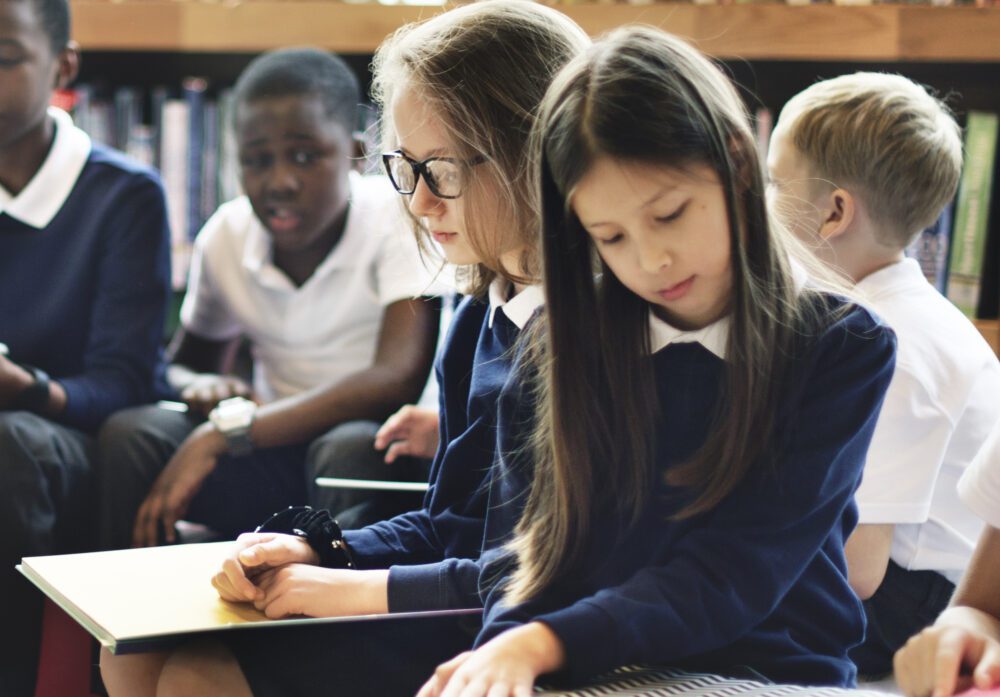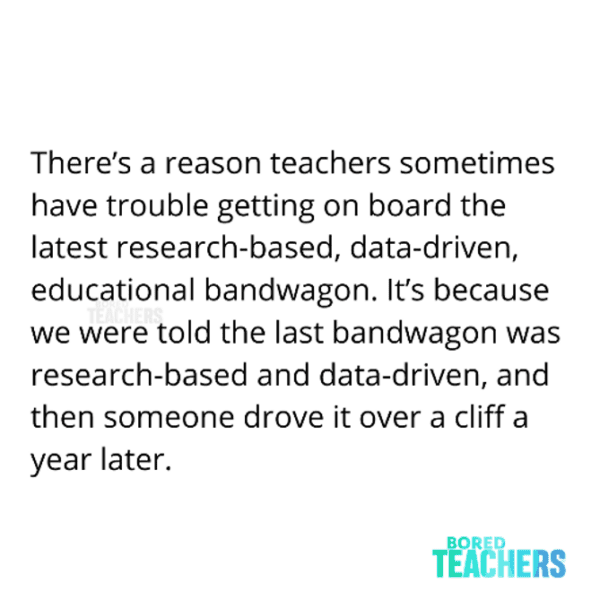Newsletter Articles, Posts for Parents, Schooling & Homework, Teachers Matter, Teachers’ Help
Why our schooling system is flawed and what we need to change

Over the last month while running seminars and attending conferences I have had many conversations with early childhood educators and teachers from primary to secondary who are so disillusioned, disappointed, frustrated and sad at the state of education in Australia. These same concerns are common in the UK, Canada, USA and also New Zealand.
In listening to these conversations, I can now understand why so many teachers are leaving the profession due to burnout and for the sake of their own mental wellbeing. How incredibly sad is that? If you haven’t had the opportunity to read Gabbie Stroud’s book, Teacher, which explores her unique experiences that led her to walk away from the career she loved – please do.
I began writing about my concerns about the shifts in education in my first book in 2003 when I noticed a shift in approaches to curriculum and learning. I believe we’ve made two enormous mistakes that now seem impossible to change.
The first is stealing a year from childhood, making children begin formalised learning at the age of five, rather than six. This means we’re also beginning middle school where, again, we push students into a more highly pressured, stressful environment a year earlier than previously. Finnish schools do not start formal learning until the age of seven, they have very little testing and academic competition is almost non-existent between schools and students. They also have regular opportunities for play during the day, all the way through primary school! Finland features very highly on the scales of academic excellence, consistently, whereas Australia used to feature highly, but now features very lowly.
The next disturbing shift has been in the academic expectation of students. This is a message I received last week.
“Just read Maggie’s article about stealing kids’ childhoods. This is what we’re dealing with (see the pic of the marking rubric later in this article)) as parents. My son is nine. I have a degree in astrophysics and this is the kind of stuff I did at university not Year 5 at primary school.”
Last year, journalist Madonna King and author Rebecca Sparrow gathered significant information from Queensland teachers about the challenges being experienced by teachers and students, and a key issue was the content in the curriculum being used in schools. Staggeringly, there were university lecturers and professors who gave examples of content that is now a part of secondary curriculums, even as low as year nine that used to be in university curriculums! WTH?
Stressed teachers and students don’t help children learn
When students are unable to achieve academic success, they can very quickly turn into disengaged learners, disillusioned students and their stress levels can turn into inappropriate behaviour.
Teachers are aware of this and yet have no freedom or autonomy to change curriculum expectations! When Madonna and Rebecca approached the Queensland Education Department with their data, they said they were given platitudes and completely ignored … and nothing changed.
I know the feeling. This is exactly what happened when I took my submission to the Federal Government in 2013 called Stop Stealing Childhood in the Name of Education. Despite gathering information from educators, parents and allied health professionals over three months, and delivering it in person in Canberra, it was not acknowledged. Nup, I didn’t even get an email to acknowledge the receipt of it!
Teachers tell me that standardised testing and the endless gathering of data has sucked the life force out of education on all levels. Teachers are trained to understand assessment and that it needs to be a guide towards learning outcomes, however standardised tests are now the point of learning!
Student disengagement especially for today’s digital natives is already a challenge for today’s teachers in our classrooms.
For teachers to create engaging, interesting learning journeys they need to have the time, the energy, and the autonomy to be creative educators. This is impossible when they are endlessly testing and gathering data, and treating children like they are brains on the seat.
The importance of positive school cultures and relational safety in creating environments where learning can take place respectfully takes time and the energy of all staff in schools. Exhausted teachers and school leaders are more focused on survival at the moment in many schools, rather than thriving.
Another thing that does not help is the ‘teacher bashing’ and disrespect in blaming schools for declining education standards, increases in school reluctance and refusal, and the increasing violence in our schools. Schools don’t do this on their own. This is more a problem of changes in our digital society and until the unique triangle of parent-student-teacher accepts that they are all a part of the solution, things may not change.
When we disrespect educators and teachers, especially with mandated requirements – especially ones that they disagree with – we draw the lifeforce and enthusiasm out of them. So often the authorities that mandate the latest educational bandwagon, have either never been a teacher in a classroom, or haven’t been in a classroom for a very long time.

Again, there are vast differences between how teachers in Finland are treated and this opinion piece from Education Review shares some great insights into that.
3Cs to motivation
Motivation is influenced by three things; competence and most experienced teachers have this in bucketloads! The second thing is connection – positive relationships within school environments and with a higher authority. The third thing is autonomy and control where teachers are able to make choices in their classrooms to meet the unique needs of their students. Sadly, they are so busy testing, gathering data, ticking boxes and doing Rubric’s cubes, they are unable to sustain their motivation for the career they once loved. This is an example of just one complex marking guide for a Year 5 student (the one sent to me earlier by the astrophysicist parent).

I have already written a very long piece about what needs to happen to change education in our schools – and it definitely needs changing. If you haven’t read this, please do.
Children are whole beings not just brains on a seat. The increased pressure at school often goes home with kids and we see meltdowns in the car, overloaded nervous systems, homework wars and heightened anxiety around bedtime.
Home needs to be a place where kids get restored and many parents struggle with homework and extra-curricular activities when children are tired. Neurodivergent students can struggle more with regulating in neuro-normative classrooms and school grounds.
Back to basics
If we get back to the basics that would be helpful.
- “Happy, calm children learn best.” – Daniel Goleman (author of Emotional intelligence).
- We need to seriously question the benefits of NAPLAN and spend the millions of dollars it costs, targeting areas of greater need in our schools.
- Put Maslow before Bloom… we need more fun and opportunities that bring joy to students so they want to come to school!
- We need to recognise that many boys struggle transitioning into big school and into high school and their behaviour is often punished, rather than being recognised as a lack of skills and heightened stress.
- The diminution of play as a priority in kindergarten and preschool and primary school can be damaging to our children’s ability to function as social beings – which is still our key biological drive. David Whitebreadwrote that there is ‘powerful evidence’ of the value and importance of play in young children’s development, especially the value of extended periods of playful learning before the start of formal schooling. Bring back play!
- Teachers need to have clear boundaries around parent emails – expecting a quick response from a teacher to a late-night email is unacceptable. Bounce-back messages need to be in place.
- Let’s lean in with compassion, gratitude and support for our teachers– instead of more judgement and blame – both in the school car park and online.
- Let’s join our voices together to bring about positive transformation of our education system.
The good news in Australia, is that the new Federal Minister of Education Jason Clare seems to genuinely want to hear from teachers, educators, and anyone vested in education in the hope of creating a better and fairer system, to take part in a survey. I can assure you I will be a part of this.
So please, take some time and explore your concerns and your wishes for a better way forward for our children.
I know you’re busy, and I know you may struggle to find time, but this survey is only open for the next month – please take this action.
If you are a teacher or an educator, please make a time to fill it in individually or together as a staff – your voices need to be heard loudly. Parents – the same goes for you. Your concerns matter and it has been rare that your voices have been considered.
Complete the survey here.
It is not all bad news. I spoke to a few teachers who come from schools that are making changes despite the curriculum. More outside classrooms, less testing, more time in nature and more involvement with parents. There is definitely a growing trend towards more innovation in schools around Australia.
Some democratic schools are embracing the importance of play, especially nature-based play and hopefully in time this will become more normalised. Some schools have multi-ages in classrooms and more student autonomy in their own learning journeys and many are creating engaging play spaces with risky play, scooters, trampolines and bikes in our school grounds. Increasing recess and lunch times and giving students more time to play does help children become more engaged learners in the classroom and often increases educational outcomes, especially for our digital natives.
Some wonderful schools are addressing the additional needs of boys, and neurodivergent students and our First Nations students. Many schools are recognising the flaws of behaviourism and turning to use Dr Ross Greene’s Collaborative and Proactive Solutions (CPS) model to help students who struggle.
Some schools have also chosen to address teacher wellbeing in meaningful and practical ways instead of running ineffective professional development sessions that steal planning and prep time!
Such positive change can only start with positive leadership.
Exceptional teachers aren’t just people who deliver curriculums. What are they?
Exceptional teachers are highly skilled social engineers working in the field of human potential ensuring the world becomes a better place.
They are dedicated professionals working in the art of positive “people making” to create a world full of opportunity, abundance and peace for all.
Teachers are privileged to work with the most sacred people on earth – children – and they make a positive difference often to allow each of them to become the best person they can be.
A huge thank you to all the teachers and educators, for all you do. I see you. I hear you. I value you. And I have your back.
Image credit: © by Rawpixel / depositphotos.com



